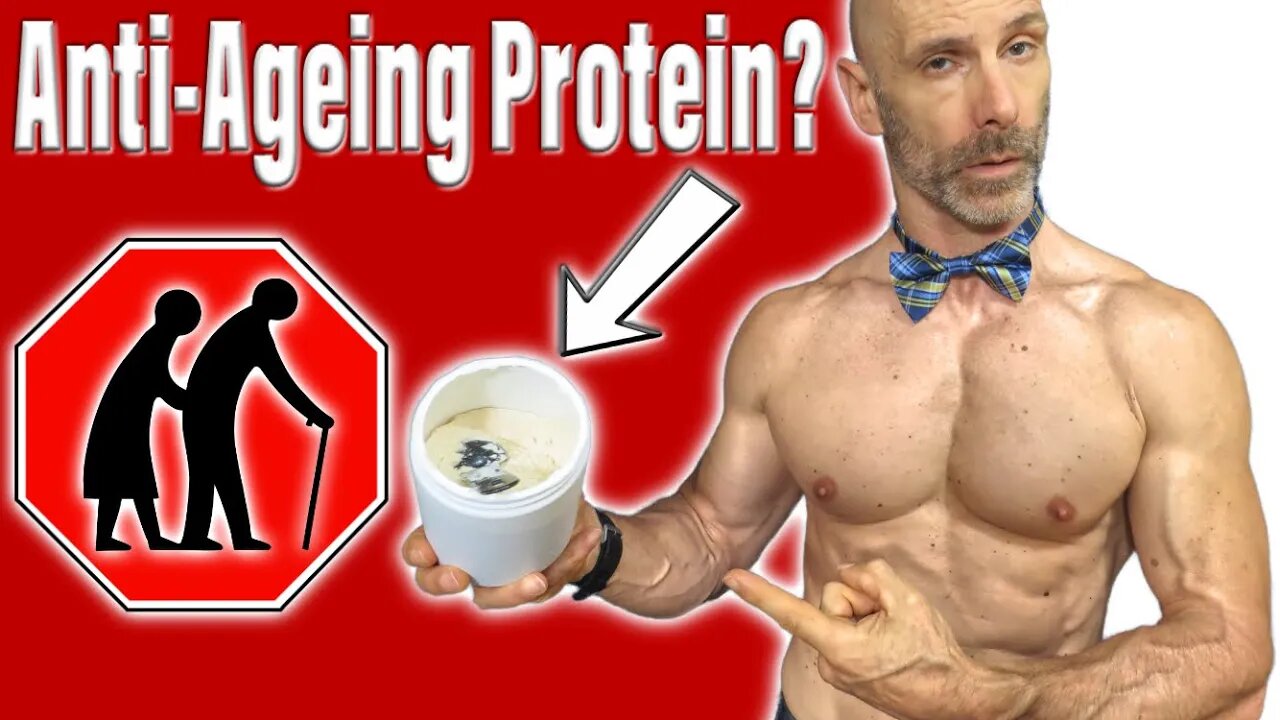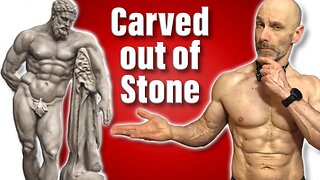Premium Only Content

Collagen Protein For Men Over 50 (Peptides, Hydrolyzed)
Collagen protein for men over 50 (peptides, hydrolyzed)
30% of the protein in our body is collagen, with age we start to produce less, and it's lower in quality.
One of the most visible signs of a reduction in collagen is seen in our skin, with wrinkles appearing and it starting to sag.
Collagen also helps to protect our joints by maintaining the cartilage in them. As we age, this protection degrades, and the risk of osteoarthritis goes up.
But that’s not all; it helps to keep our bones and arteries strong.
Improving our ability to produce quality collagen slows down ageing by keeping our skin, bones and joints healthy.
So it’s essential to do everything we can to keep our collagen production functioning optimally over 50.
If you are interested in losing body fat and adding muscle, please email me at 1shark1bite@gmail.com for information on my personal training services.
If you would like a set of Torrobands for yourself, here is my affiliate link so you can receive 50% off on your purchase https://sale.torroband.com/?affId=555B3E5D
Check your testosterone levels from home. Just click this link http://trylgc.com/laurence and receive 20% off with code: LAURENCE20 I receive commissions on referrals to LetsGetChecked. I only recommend services I know and trust.
My Affiliate link to Lebert for their Equalizer bars and more; https://lebertfitness.com/?ref=FitAnd50 and use the discount code FITAND50 you will receive 20% off your purchase
Facebook; https://www.facebook.com/Fit-and-50-5...
My Amazon page link; https://www.amazon.com/shop/fitand50
Today we’re going to look at how to do this through nutrition and supplementation.
The most common way to supplement is through collagen peptides or hydrolyzed collagen. Two different terms, but they mean the same thing, collagen protein that has been broken down into peptides, which are short chains of amino acids linked by peptide bonds.
When we take a collagen supplement, there is no guarantee that these amino acids will be reassembled in the body as collagen protein.
What we do know is we are providing the body with the building blocks needed to make collagen, and they experimented with mice by injecting them with radioactive collagen peptides, finding that after intestinal absorption, these peptides were preferentially used in cartilage and bone.
When it comes to wrinkles, there’s evidence that it can help with one study showing improvement in skin hydration and elasticity after 12 weeks.
To see if supplementing reduced joint pain and symptoms of osteoporosis, I looked at a 2016 systemic review. The goal was to review all the current studies to see if hydrolyzed collagen had a therapeutic use on osteoporosis and osteoarthritis.
It found that it did indeed play a positive role, potentially increasing bone mineral density, having a protective effect on joint Cartilage, with its primary advantage being that it provided symptomatic relief of pain.
Briefly, I want to talk about Collagen protein and muscle growth. Some studies have shown it to aid in muscle growth. But it isn’t the best choice if your main goal is to build muscle. It’s an incomplete protein and low in branch chain amino acids, in particular Leucine which is a key amino in stimulating muscle protein synthesis.
We can support our body's ability to make collagen by avoiding things that negatively affect its production and eating foods that provide the nutrition to encourage its ability to manufacture it.
Vitamin C is used to make collagen, with citrus fruits like oranges being a great source. Berries, including strawberries and blueberries, are high in C too.
Proline and glycine are two amino acids that makeup collagen protein. Proline is found in eggs, dairy products like cottage cheese and vegetables like cabbage, asparagus and mushrooms.
Glycine is found in large amounts in both pork and chicken skin. As well as most meats. For vegan sources, the list is shorter, with seaweed, watercress and spinach being some of the best options.
Copper also plays a role in collagen production. Beans, cashews, and organ meats make this list.
Bone broth is a rich source of collagen, as is gelatin which is basically cooked collagen. Again, once these are digested, there is no guarantee that the amino acids will be used to make new collagen in our body, and we don’t have testing on radioactive mice to help us draw a conclusion.
But it’s a great way to ensure we have plenty of nutrients the body needs to get the job done.
We need to avoid having too much sugar and refined carbs in our diet as it interferes with our ability to repair collagen.
Too much sun, smoking and overconsuming alcohol are some more items that rank high on the list of things that damage our ability to produce collagen.
https://www.scielo.br/j/rbgg/a/fk95TfhxB7mPsmqYRDdHH8K/?format=pdf&lang=en
-
 4:47
4:47
Fit and 50
1 year ago $0.04 earnedThe Best Way to Choose Exercises for Muscle Growth (Greek god Physique)
5472 -
 1:31:18
1:31:18
Redacted News
7 hours agoEMERGENCY! NATO AND CIA ASSASSINATE TOP RUSSIAN GENERAL, PUTIN VOWS IMMEDIATE RETALIATION | Redacted
213K344 -
 56:45
56:45
VSiNLive
6 hours ago $5.02 earnedFollow the Money with Mitch Moss & Pauly Howard | Hour 1
59.2K2 -
 52:44
52:44
Candace Show Podcast
6 hours agoMy Conversation with Only Fans Model Lilly Phillips | Candace Ep 122
73.9K259 -
 LIVE
LIVE
tacetmort3m
7 hours ago🔴 LIVE - RELIC HUNTING CONTINUES - INDIANA JONES AND THE GREAT CIRCLE - PART 5
213 watching -
 26:52
26:52
Silver Dragons
5 hours agoCoin Appraisal GONE WRONG - Can I Finally Fool the Coin Experts?
32.6K2 -
 UPCOMING
UPCOMING
Bare Knuckle Fighting Championship
11 hours agoBKFC on DAZN HOLLYWOOD WARREN vs RICHMAN WEIGH IN
19.3K -
 6:49:16
6:49:16
StoneMountain64
9 hours agoNew PISTOL meta is here?
31.2K1 -
 20:58
20:58
Goose Pimples
11 hours ago7 Ghost Videos SO SCARY You’ll Want a Priest on Speed Dial
17.8K3 -
 2:24:59
2:24:59
The Nerd Realm
9 hours ago $2.80 earnedHollow Knight Voidheart Edition #09 | Nerd Realm Playthrough
35K2